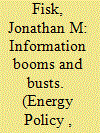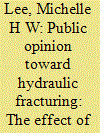|
|
|
Sort Order |
|
|
|
Items / Page
|
|
|
|
|
|
|
| Srl | Item |
| 1 |
ID:
178812


|
|
|
|
|
| Summary/Abstract |
The UK government's policy of support for shale gas extraction ended in November 2019 with the imposition of a moratorium on fracking (hydraulic fracturing) in England, and an admission that the policies to manage induced seismicity were insufficient. However, ambiguities remain regarding its scope, despite attempts at clarification. The concept of fracking to improve hydrocarbon production has evolved from defining a specific engineering process, using high volumes of water, to encompass other ‘unconventional’ methods to achieve the same end. We resolve the various definitions in a scientific, technical, regulatory and legislative context, robustly define unconventional extraction methods (circumventing the need to identify and quantify the various technologies available), and advocate the precautionary principle in drafting and interpreting regulations. Policy should be driven by the engineering of the bulk physical characteristics of the target rock, rather than by the current definitions based on injected fluid volume. To meet climate change concerns, the moratorium should be converted into a ban. In the interim, we argue that, in order to comply with the government's policy of ensuring safe and sustainable operations, the moratorium should be extended to all well stimulation treatments for unconventional hydrocarbon extraction, including acid stimulation.
|
|
|
|
|
|
|
|
|
|
|
|
|
|
|
|
| 2 |
ID:
150453


|
|
|
|
|
| Summary/Abstract |
Unconventional oil and gas development (UOGD) has recently become the subject of much research. However, neglected during this effort are the leases signed between landowner and industry that act as the foundation for development and may influence the distribution and intensity of associated impacts. These leases amount to an inscribed collection of rules and practices that define a wide variety of conditions related to development. The temporal and geographic distribution of lease terms may directly influence a number of phenomena of interest to scholars studying UOGD. In order to advance research on the subject, we (1) describe and outline research topics that could be addressed by applying social science methods to the analysis of leases and specific lease provisions, (2) discuss challenges and strategies for data collection and (3) review policy implications of lease related research.
|
|
|
|
|
|
|
|
|
|
|
|
|
|
|
|
| 3 |
ID:
130458


|
|
|
|
|
| Publication |
2014.
|
| Summary/Abstract |
The energy business has a way of making smart people look dumb. Experts were blindsided by the shale revolution in the United States. For most of the last few decades, they had assumed that U.S. domestic energy supplies were dwindling. Then, advances in horizontal drilling and hydraulic fracturing, or "fracking" -- the injection of high-pressure streams of sand, water, and chemicals into underground shale and other rock to unlock oil and natural gas trapped there -- significantly boosted total U.S. natural gas production, by as much as 25 percent in recent years, forcing many experts to change their tune. Horizontal drilling and fracking are now having an even bigger impact on domestic oil production: five years ago, most new onshore rigs were drilling for shale gas, but today, most are drilling for oil in shale and so-called tight rock formations. Experts are confidently pointing to the benefits of abundant supplies of this unconventional oil and gas for the U.S. economy: lower energy costs, new jobs, and even a revival in some parts of the manufacturing sector. Politicians from both parties, meanwhile, are vying to be the most enthusiastic boosters of domestic natural gas.
|
|
|
|
|
|
|
|
|
|
|
|
|
|
|
|
| 4 |
ID:
166322


|
|
|
|
|
| Summary/Abstract |
Today's 'fracking debate' includes a familiar set of actors and arguments. Advocates of unconventional oil and gas production contend that it has contributed to an economic renaissance for many subnational governments and has improved American energy security. Opponents suggest that unconventional production is an environmental and public health hazard. One way that states are trying to balance the economic benefits of continued energy production with environmental protection is through the use of information disclosure requirements. Prior work notes that the rigor of state disclosure standards relative to unconventional oil and gas production vary. Through measures of association and exact logistic regression, this project expands the disclosure literature by focusing on three types of disclosure: pre-drilling notification, chemical disclosure during operations, and trade secret exemptions.
|
|
|
|
|
|
|
|
|
|
|
|
|
|
|
|
| 5 |
ID:
166372


|
|
|
|
|
| Summary/Abstract |
A survey with an embedded experiment was conducted to test how residents would respond to a commitment by oil and natural gas producers to conduct nearby fracking operations in a manner that is more protective of health and the environment than existing state and federal regulations. The experiment specifically assessed how the use of independent third-party certification of operations coupled with "beyond compliance" practices would influence local public support for oil and gas development. The state of Colorado was chosen due to its long history of oil and gas development, its leadership amongst states in advancing fracking, and the current local-level conflicts surrounding oil and gas development. A public opinion survey (N = 390) of a representative sample of Colorado residents found that "green certification" of a production company's activities led to substantially increased levels of support for a hypothetical nearby oil and natural gas project. Our findings suggest that oil and gas developers can obtain greater public support for their projects by voluntarily engaging in practices that are more protective than current state and federal regulations together with third-party certification of those practices. In effect, these coupled actions serve as a mechanism that promotes a firm's "social license to operate".
|
|
|
|
|
|
|
|
|
|
|
|
|
|
|
|
| 6 |
ID:
125696


|
|
|
|
|
| Publication |
2013.
|
| Summary/Abstract |
The study reports data from an economic choice experiment to determine the likely welfare impacts of hydraulic fracturing, in this case using natural gas extracted by hydraulic fracturing for household electricity. Data were collected from an Internet survey of 515 residents of New York State. The welfare analysis indicated that on average households incur a welfare loss from in-state hydraulic fracturing as the source of their electricity. The evidence suggests that households in shale counties bear more costs from HF electricity than households out of shale counties. The average welfare loss is substantive, estimated at 40-46% of average household electric bills in shale counties and 16-20% of bills in counties without shale. The evidence also suggests that relative proximity to HF well sites also increases cost borne by households.
|
|
|
|
|
|
|
|
|
|
|
|
|
|
|
|
| 7 |
ID:
150051


|
|
|
|
|
| Summary/Abstract |
Regulatory inspection and violation reports provide insight into the impact of natural gas extraction on the surrounding environment, human health, and public safety. Inspection reports for natural gas wells in Pennsylvania were collected from the Pennsylvania DEP Compliance Report from 2000 to 2014. Analysis of 215,444 inspection records for 70,043 conventional and unconventional wells was conducted in order to compare the odds of violations occurring under different circumstances. Logistic regression models were used to estimate the probability of violations occurring for both conventional and unconventional wells. When inspected, conventional wells had 40% higher odds of having a violation. However, unconventional wells had higher odds for environmental violations related to waste discharge as well as cementing and casing failures. Large operators had 40% lower odds of having any violation than smaller operators. While larger operators had fewer violations, a few of the largest companies had rates of violation much higher than the average for all operators, with some reaching violation rates as high as 1 in 4 active wells. A well also has a higher chance of being in violation if it is in the first year (85%) or second year (109%) since its spud date.
|
|
|
|
|
|
|
|
|
|
|
|
|
|
|
|
|
|
|
|
|